Comprehensive Analysis: Baradat's Framework of Communism
VerifiedAdded on 2022/08/18
|5
|1068
|18
Essay
AI Summary
This essay provides an analysis of Baradat's framework of communism, focusing on his examination of various political ideologies, with a specific emphasis on the historical and philosophical underpinnings of communism. The essay delves into the influence of the Industrial Revolution, the roles of key thinkers such as Marx and Engels, and the application of Marxism in different contexts, including the Soviet Union, Yugoslavia, Maoist China, and Cuba. The essay explains Marx's core principles, including economic determinism, the division of labor, and the emergence of the bourgeoisie and proletariat. It also addresses criticisms of Marx's theory. The document explores the evolution of communist thought, providing a comprehensive overview of the subject.
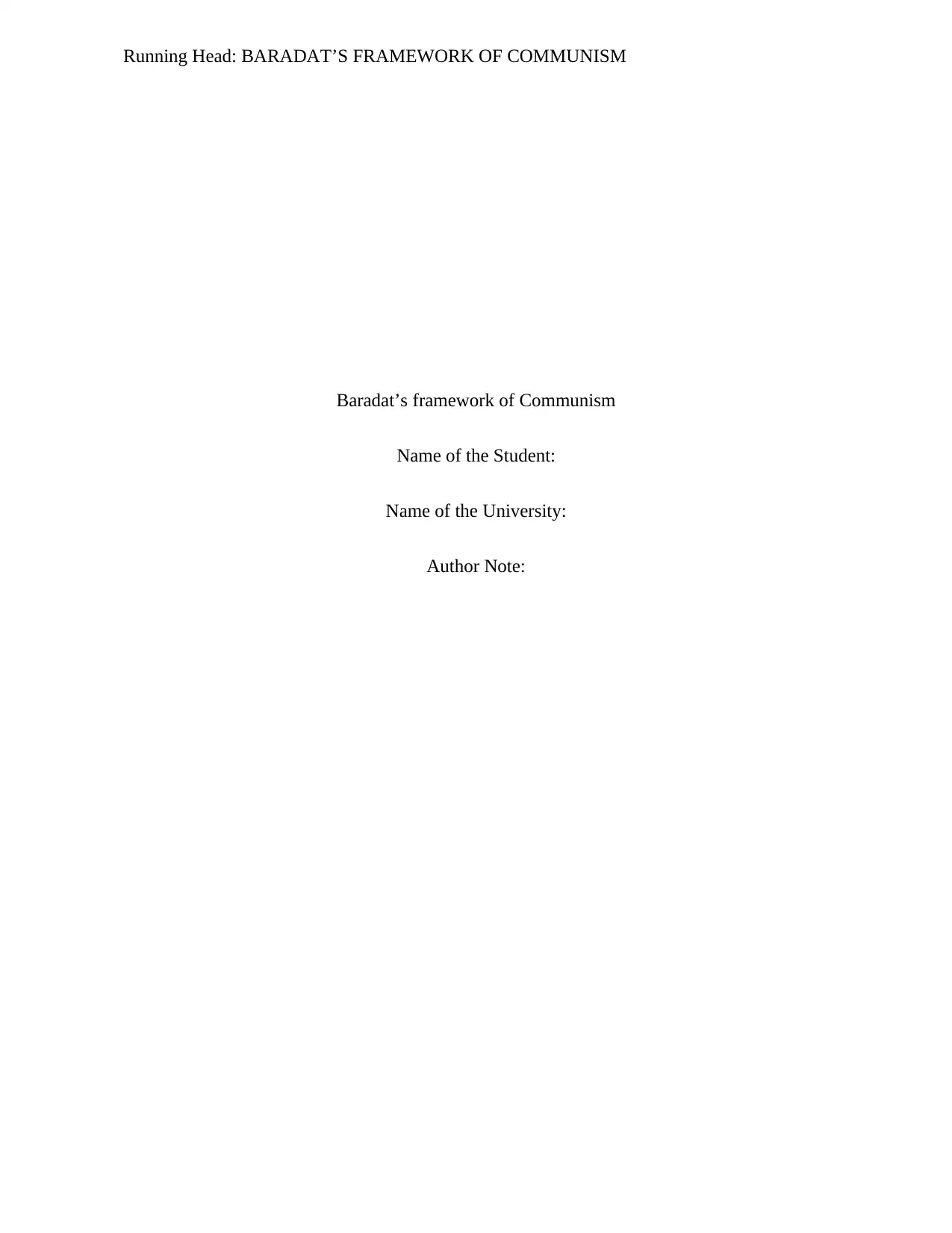
Running Head: BARADAT’S FRAMEWORK OF COMMUNISM
Baradat’s framework of Communism
Name of the Student:
Name of the University:
Author Note:
Baradat’s framework of Communism
Name of the Student:
Name of the University:
Author Note:
Paraphrase This Document
Need a fresh take? Get an instant paraphrase of this document with our AI Paraphraser
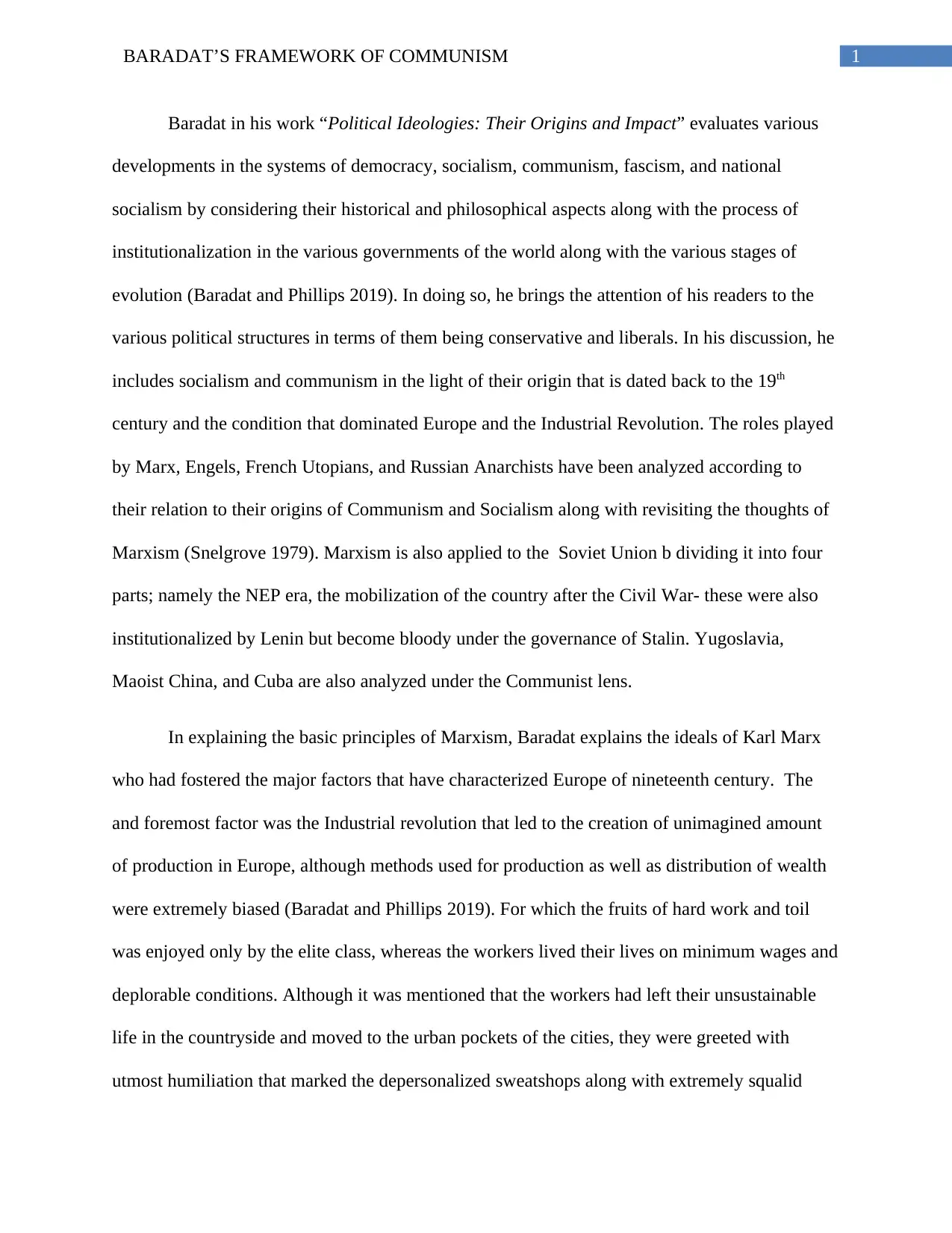
1BARADAT’S FRAMEWORK OF COMMUNISM
Baradat in his work “Political Ideologies: Their Origins and Impact” evaluates various
developments in the systems of democracy, socialism, communism, fascism, and national
socialism by considering their historical and philosophical aspects along with the process of
institutionalization in the various governments of the world along with the various stages of
evolution (Baradat and Phillips 2019). In doing so, he brings the attention of his readers to the
various political structures in terms of them being conservative and liberals. In his discussion, he
includes socialism and communism in the light of their origin that is dated back to the 19th
century and the condition that dominated Europe and the Industrial Revolution. The roles played
by Marx, Engels, French Utopians, and Russian Anarchists have been analyzed according to
their relation to their origins of Communism and Socialism along with revisiting the thoughts of
Marxism (Snelgrove 1979). Marxism is also applied to the Soviet Union b dividing it into four
parts; namely the NEP era, the mobilization of the country after the Civil War- these were also
institutionalized by Lenin but become bloody under the governance of Stalin. Yugoslavia,
Maoist China, and Cuba are also analyzed under the Communist lens.
In explaining the basic principles of Marxism, Baradat explains the ideals of Karl Marx
who had fostered the major factors that have characterized Europe of nineteenth century. The
and foremost factor was the Industrial revolution that led to the creation of unimagined amount
of production in Europe, although methods used for production as well as distribution of wealth
were extremely biased (Baradat and Phillips 2019). For which the fruits of hard work and toil
was enjoyed only by the elite class, whereas the workers lived their lives on minimum wages and
deplorable conditions. Although it was mentioned that the workers had left their unsustainable
life in the countryside and moved to the urban pockets of the cities, they were greeted with
utmost humiliation that marked the depersonalized sweatshops along with extremely squalid
Baradat in his work “Political Ideologies: Their Origins and Impact” evaluates various
developments in the systems of democracy, socialism, communism, fascism, and national
socialism by considering their historical and philosophical aspects along with the process of
institutionalization in the various governments of the world along with the various stages of
evolution (Baradat and Phillips 2019). In doing so, he brings the attention of his readers to the
various political structures in terms of them being conservative and liberals. In his discussion, he
includes socialism and communism in the light of their origin that is dated back to the 19th
century and the condition that dominated Europe and the Industrial Revolution. The roles played
by Marx, Engels, French Utopians, and Russian Anarchists have been analyzed according to
their relation to their origins of Communism and Socialism along with revisiting the thoughts of
Marxism (Snelgrove 1979). Marxism is also applied to the Soviet Union b dividing it into four
parts; namely the NEP era, the mobilization of the country after the Civil War- these were also
institutionalized by Lenin but become bloody under the governance of Stalin. Yugoslavia,
Maoist China, and Cuba are also analyzed under the Communist lens.
In explaining the basic principles of Marxism, Baradat explains the ideals of Karl Marx
who had fostered the major factors that have characterized Europe of nineteenth century. The
and foremost factor was the Industrial revolution that led to the creation of unimagined amount
of production in Europe, although methods used for production as well as distribution of wealth
were extremely biased (Baradat and Phillips 2019). For which the fruits of hard work and toil
was enjoyed only by the elite class, whereas the workers lived their lives on minimum wages and
deplorable conditions. Although it was mentioned that the workers had left their unsustainable
life in the countryside and moved to the urban pockets of the cities, they were greeted with
utmost humiliation that marked the depersonalized sweatshops along with extremely squalid
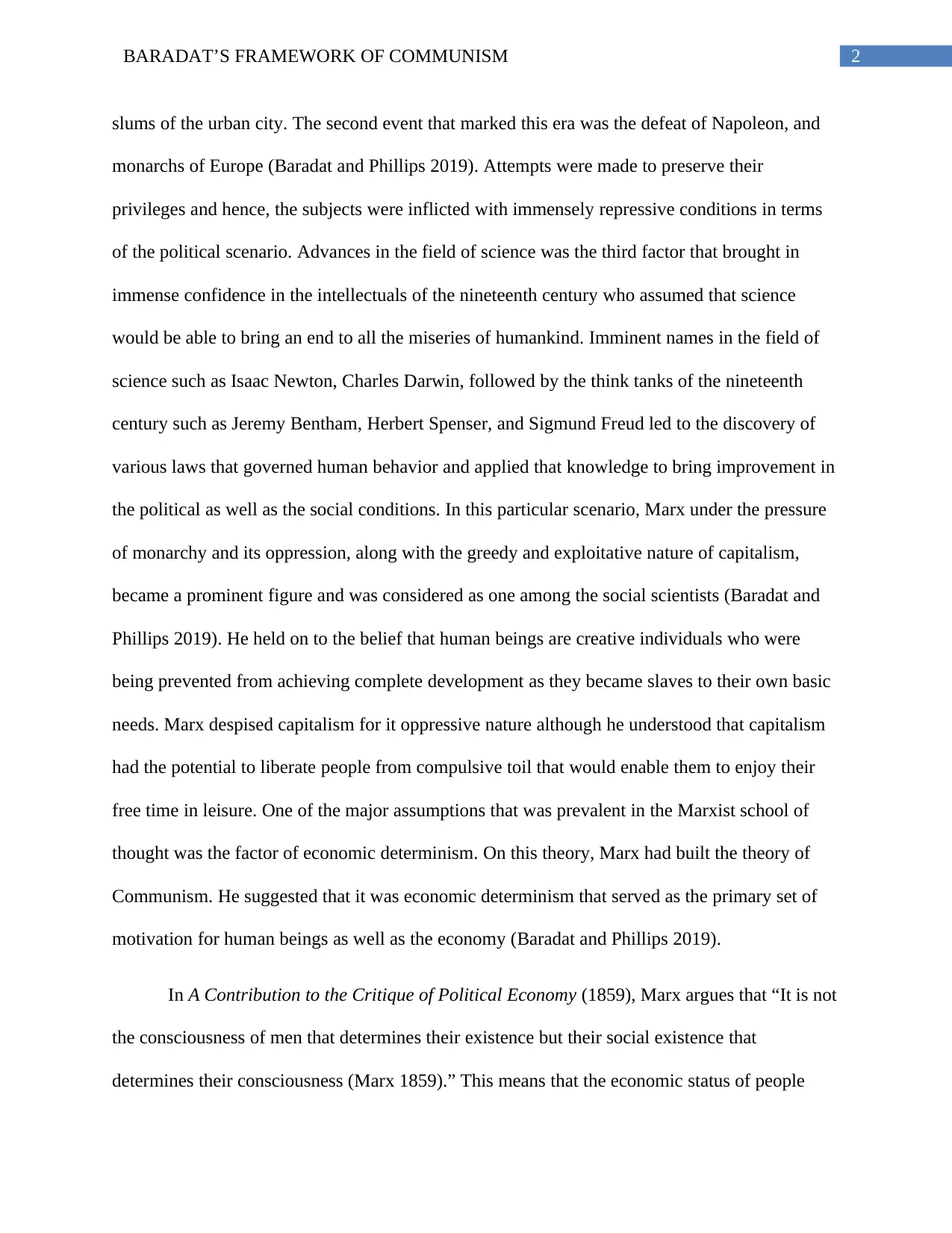
2BARADAT’S FRAMEWORK OF COMMUNISM
slums of the urban city. The second event that marked this era was the defeat of Napoleon, and
monarchs of Europe (Baradat and Phillips 2019). Attempts were made to preserve their
privileges and hence, the subjects were inflicted with immensely repressive conditions in terms
of the political scenario. Advances in the field of science was the third factor that brought in
immense confidence in the intellectuals of the nineteenth century who assumed that science
would be able to bring an end to all the miseries of humankind. Imminent names in the field of
science such as Isaac Newton, Charles Darwin, followed by the think tanks of the nineteenth
century such as Jeremy Bentham, Herbert Spenser, and Sigmund Freud led to the discovery of
various laws that governed human behavior and applied that knowledge to bring improvement in
the political as well as the social conditions. In this particular scenario, Marx under the pressure
of monarchy and its oppression, along with the greedy and exploitative nature of capitalism,
became a prominent figure and was considered as one among the social scientists (Baradat and
Phillips 2019). He held on to the belief that human beings are creative individuals who were
being prevented from achieving complete development as they became slaves to their own basic
needs. Marx despised capitalism for it oppressive nature although he understood that capitalism
had the potential to liberate people from compulsive toil that would enable them to enjoy their
free time in leisure. One of the major assumptions that was prevalent in the Marxist school of
thought was the factor of economic determinism. On this theory, Marx had built the theory of
Communism. He suggested that it was economic determinism that served as the primary set of
motivation for human beings as well as the economy (Baradat and Phillips 2019).
In A Contribution to the Critique of Political Economy (1859), Marx argues that “It is not
the consciousness of men that determines their existence but their social existence that
determines their consciousness (Marx 1859).” This means that the economic status of people
slums of the urban city. The second event that marked this era was the defeat of Napoleon, and
monarchs of Europe (Baradat and Phillips 2019). Attempts were made to preserve their
privileges and hence, the subjects were inflicted with immensely repressive conditions in terms
of the political scenario. Advances in the field of science was the third factor that brought in
immense confidence in the intellectuals of the nineteenth century who assumed that science
would be able to bring an end to all the miseries of humankind. Imminent names in the field of
science such as Isaac Newton, Charles Darwin, followed by the think tanks of the nineteenth
century such as Jeremy Bentham, Herbert Spenser, and Sigmund Freud led to the discovery of
various laws that governed human behavior and applied that knowledge to bring improvement in
the political as well as the social conditions. In this particular scenario, Marx under the pressure
of monarchy and its oppression, along with the greedy and exploitative nature of capitalism,
became a prominent figure and was considered as one among the social scientists (Baradat and
Phillips 2019). He held on to the belief that human beings are creative individuals who were
being prevented from achieving complete development as they became slaves to their own basic
needs. Marx despised capitalism for it oppressive nature although he understood that capitalism
had the potential to liberate people from compulsive toil that would enable them to enjoy their
free time in leisure. One of the major assumptions that was prevalent in the Marxist school of
thought was the factor of economic determinism. On this theory, Marx had built the theory of
Communism. He suggested that it was economic determinism that served as the primary set of
motivation for human beings as well as the economy (Baradat and Phillips 2019).
In A Contribution to the Critique of Political Economy (1859), Marx argues that “It is not
the consciousness of men that determines their existence but their social existence that
determines their consciousness (Marx 1859).” This means that the economic status of people
⊘ This is a preview!⊘
Do you want full access?
Subscribe today to unlock all pages.

Trusted by 1+ million students worldwide
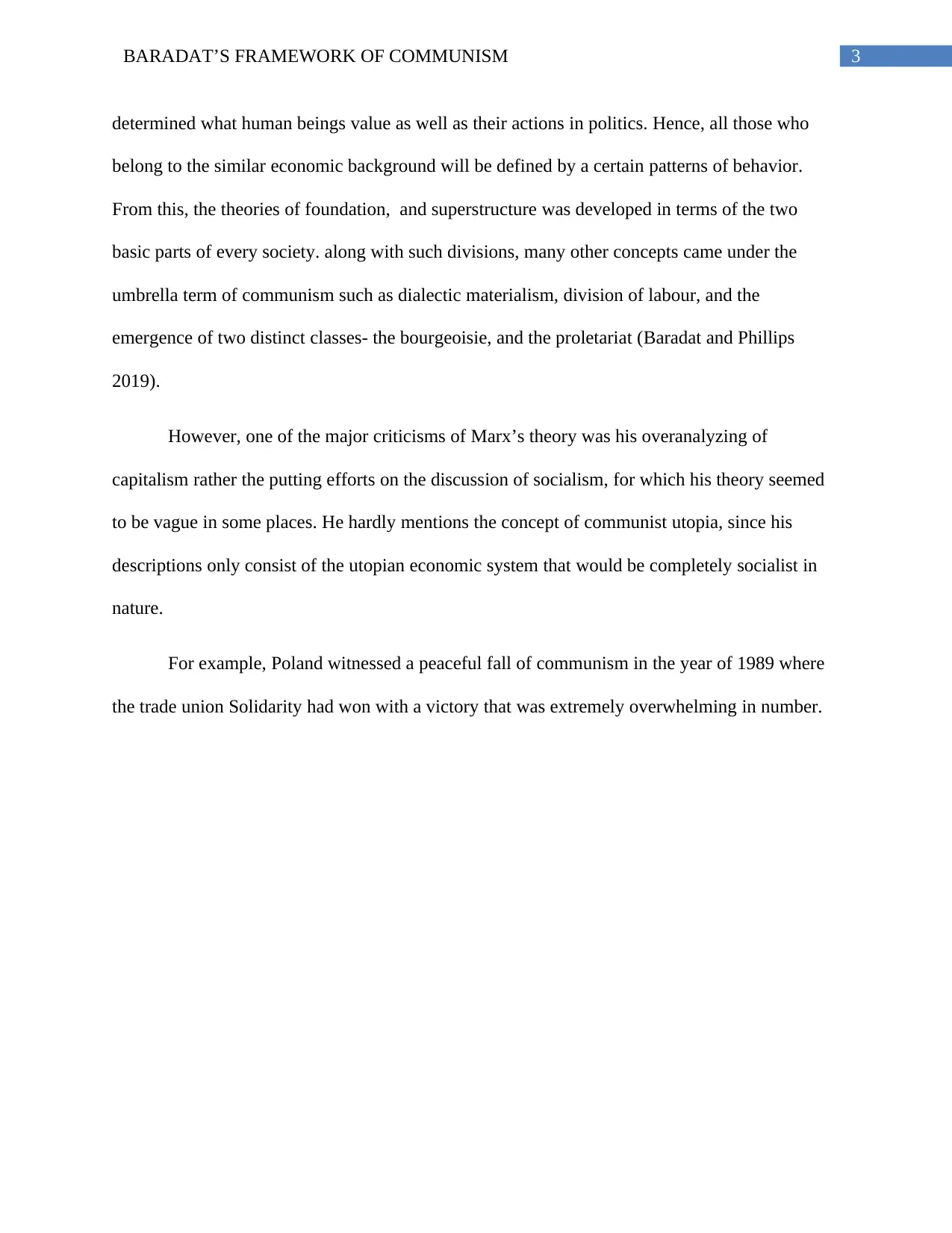
3BARADAT’S FRAMEWORK OF COMMUNISM
determined what human beings value as well as their actions in politics. Hence, all those who
belong to the similar economic background will be defined by a certain patterns of behavior.
From this, the theories of foundation, and superstructure was developed in terms of the two
basic parts of every society. along with such divisions, many other concepts came under the
umbrella term of communism such as dialectic materialism, division of labour, and the
emergence of two distinct classes- the bourgeoisie, and the proletariat (Baradat and Phillips
2019).
However, one of the major criticisms of Marx’s theory was his overanalyzing of
capitalism rather the putting efforts on the discussion of socialism, for which his theory seemed
to be vague in some places. He hardly mentions the concept of communist utopia, since his
descriptions only consist of the utopian economic system that would be completely socialist in
nature.
For example, Poland witnessed a peaceful fall of communism in the year of 1989 where
the trade union Solidarity had won with a victory that was extremely overwhelming in number.
determined what human beings value as well as their actions in politics. Hence, all those who
belong to the similar economic background will be defined by a certain patterns of behavior.
From this, the theories of foundation, and superstructure was developed in terms of the two
basic parts of every society. along with such divisions, many other concepts came under the
umbrella term of communism such as dialectic materialism, division of labour, and the
emergence of two distinct classes- the bourgeoisie, and the proletariat (Baradat and Phillips
2019).
However, one of the major criticisms of Marx’s theory was his overanalyzing of
capitalism rather the putting efforts on the discussion of socialism, for which his theory seemed
to be vague in some places. He hardly mentions the concept of communist utopia, since his
descriptions only consist of the utopian economic system that would be completely socialist in
nature.
For example, Poland witnessed a peaceful fall of communism in the year of 1989 where
the trade union Solidarity had won with a victory that was extremely overwhelming in number.
Paraphrase This Document
Need a fresh take? Get an instant paraphrase of this document with our AI Paraphraser
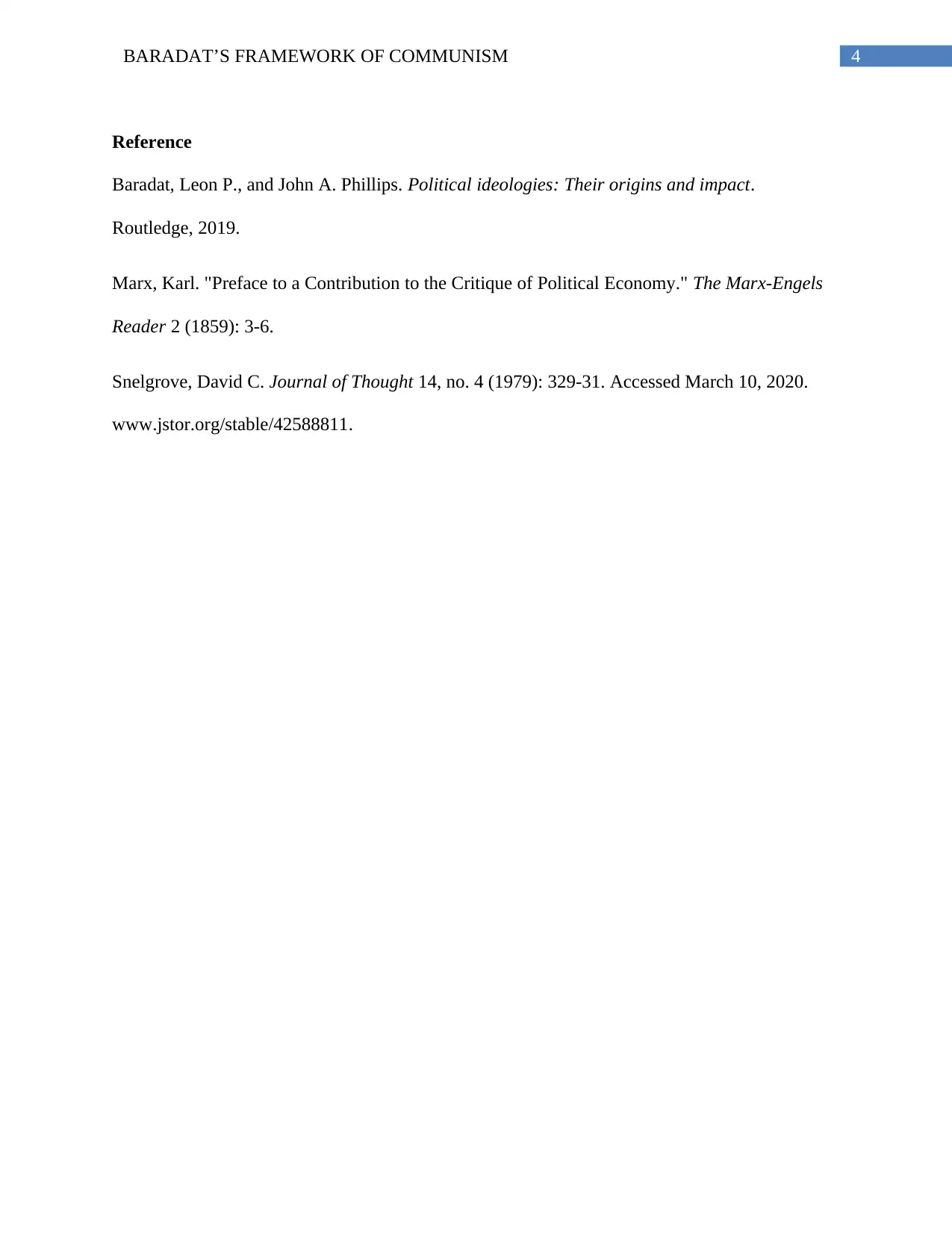
4BARADAT’S FRAMEWORK OF COMMUNISM
Reference
Baradat, Leon P., and John A. Phillips. Political ideologies: Their origins and impact.
Routledge, 2019.
Marx, Karl. "Preface to a Contribution to the Critique of Political Economy." The Marx-Engels
Reader 2 (1859): 3-6.
Snelgrove, David C. Journal of Thought 14, no. 4 (1979): 329-31. Accessed March 10, 2020.
www.jstor.org/stable/42588811.
Reference
Baradat, Leon P., and John A. Phillips. Political ideologies: Their origins and impact.
Routledge, 2019.
Marx, Karl. "Preface to a Contribution to the Critique of Political Economy." The Marx-Engels
Reader 2 (1859): 3-6.
Snelgrove, David C. Journal of Thought 14, no. 4 (1979): 329-31. Accessed March 10, 2020.
www.jstor.org/stable/42588811.
1 out of 5
Related Documents
Your All-in-One AI-Powered Toolkit for Academic Success.
+13062052269
info@desklib.com
Available 24*7 on WhatsApp / Email
![[object Object]](/_next/static/media/star-bottom.7253800d.svg)
Unlock your academic potential
Copyright © 2020–2026 A2Z Services. All Rights Reserved. Developed and managed by ZUCOL.




